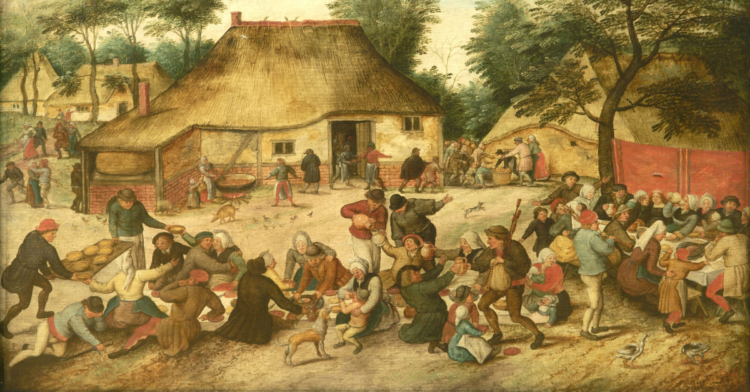Based on what we commonly understand about the middle ages, it’s easy to see why a lot more of us dreamed of living like kings than the peasants they wouldn’t even have to look at.
After all, if the harvests didn’t turn out right, a peasant could find themselves on the brink of starvation. And if their lords or the king decided they were angry enough to go to war, it was the peasants who were the most likely to suffer the consequences of that decision. And naturally, everything about the Black Plague sounds terrifying.
Judging by what we understand about the long work days and weeks of the 19th century (not to mention the lack of child labor laws), we might think a peasant’s work day was just as nightmarish.
However, it turns out that they might actually have been horrified by our workloads and not the other way around.
Considering how poor peasants at the time were, it sounds awful to learn that they could be expected to work 16-hour days on top of that.

However, as Boston College sociologist Juliet Schor wrote in her book The Overworked American: The Unexpected Decline Of Leisure , it’s important to note that while their work might stretch across those 16 hours, much fewer of those hours were spent working than you might expect.
For one thing, it was more about a dawn-to-dusk period of work, so it would actually shrink back down to eight hours during the winter.
That long stretch also came with a lot of breaks along the way.

Specifically, work came to a dead stop for breakfast, lunch, dinner, and an afternoon nap. Depending on when and where a peasant worked, it also wasn’t unusual to have additional breaks in mid-morning and mid-afternoon.
It’s also important to keep in mind that this describes what work was like in peak harvest seasons. During slack periods of the year, it was commonly agreed that there wasn’t much of a point to working regular hours.
All told, the amount of time spent working averaged out to about eight hours per day.
This difference between periods of farming is one of the limitations of the research it was possible for Schor to conduct.

As she wrote, it’s hard to get many average figures for work at the time, as such data wasn’t necessarily recorded at that time. With that in mind, she based her findings on estimates for individual roles peasants in England could conceivably fill. England was chosen because peasants there were apparently worked harder than in France or Spain at the time.
Schor also noted that the workloads between men and women at the time were very different and there’s no direct data on how much women had to do, either.
Still, the evidence she could find suggests that the domestic work a woman was expected to do would have been more regular and therefore harder than the men’s work out in the fields.
But while the typical work day for a peasant may not sound too different from what you’re used to, there was a big difference in how it was done.

Schor references French historian Jacques LeGoff, who described the pace of work as leisurely and unconcerned with the precision, productivity and speed requirements that characterize a lot of modern working conditions.
This was partially because the concept of measuring time by the hour or minute essentially didn’t exist yet and so it was unclear how much time could be “wasted” if they thought of it that way.
However, these laid back conditions were also partially because the peasants didn’t have much to eat back then.

The lower the energy requirements for working back then, the more possible it was to actually sustain that work over the periods of time required.
And when we look beyond a peasant’s working day into their whole year, we see even more evidence that they led less busy lives than us.

As Schor wrote , holidays set by the church such as Christmas, Easter, and another period in the middle of summer ran for days at a time. A peasant could also expect not to have to work during the various rest days and saint’s days peppered throughout the year.
While it’s true that they were expected to spend some of that time in church, they were also times of feasting and drinking. That merriment also kicked into high gear for wakes and weddings, as ale supplies for these events were expected to last for weeks.
All told, this let English peasants take about a third of the year off, and Spanish peasants had it even better with a cumulative five months off.
All told, it was unusual for peasants to spend more than 150 days a year working and the average was likely closer to 120.

In terms of hours, Schor estimates that English peasants in Medieval times would have had to work about 1,440 hours a year.
By comparison, the most recent statistics from the Organization for Economic Co-operation and Development put the average annual hours Americans spent working in 2018 at 1,786 hours a year and it hasn’t dipped below 1,780 since 2010.
So while the peasants may not have had as much money or food as we do, they also didn’t have to work nearly as hard as often as we do. It’s an interesting trade-off.
h/t: The Overworked American: The Unexpected Decline Of Leisure

















































